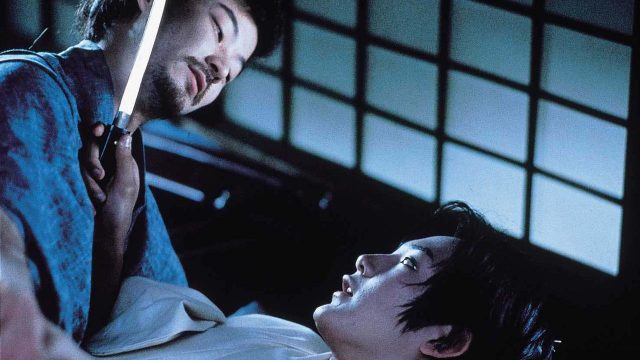Criterion Prediction #252: Taboo, by Alexander Miller

Title: Taboo
Year: 1999
Director: Nagisa Oshima
Cast: Takeshi Kitano, Ryuhei Matsuda, Tadanobu Asano, Susumu Terajima
Synopsis: The elite Shimsengumi are riven by infighting when their various warriors vie for the affections of Kano (Matsuda), a young samurai who joins their ranks.
Critique: People refer to Oshima as the “Godard of Japan” but it’s a lazy, if convenient, analogy. If we should hang any dangling monikers from his name, it should represent the revisionist spirit of his filmmaking; if Oshima is the “anything of anything,” it would be fair to say that he’s the most punk of the Japanese New Wave. Confrontationally critical of Japan’s postwar politics, and never shy away from taboo subjects (sex and violence, the juiciest of the lot), it’s only natural that Oshima eventually makes a samurai film seething with homoerotic tension. It’s not a combative subversion, nor is he broadly exploring samurai culture but honing in on the elite and iconic special wing of the shogunate, the Shinsengumi.
In filmic context, the Shinsengumi is probably best known from Tadashi Sawashima’s competent, if unremarkable, 1969 film, Shinsengumi: Assassins of Honor. Led by the ever dignified Toshiro Mifune at the height of his popularity, Sawashima’s feature is a classic embodiment of samurai cinema, so how would the elite band of warriors look through Oshima’s eye?
Well, he leans into the period with composure and lends the narrative a courtly and playfully furnished style. While some might balk at the talky interludes, Taboo is beautiful and engaging with the mature intelligence befitting a master filmmaker at the end of their career.
The actions spur from sexual power plays; manipulation and motivations are the currency and Oshima is coloring between the lines with some soapy flourishes and understated stylism. Taboo is an interesting play on the theme or trope of various people tripping over each other as they lust for a magnificent person of desire (Pasolini’s Theorem comes to mind.)
Oshima is quick to objectify the babyfaced Matsuda. His androgynous, almost porcelain presence works because he’s both beautiful and dangerous. Matsuda plays Kano with an effeminate and elusive stoicism, his arrival in the Shinsengumi is accompanied with praise of his sword skills and is immediately courted by Tashio (Asano). Simultaneously, curiosity and speculation stir the pot; it’s a dynamic variation of imperial intrigue as rumors and whispers waft through the corridors.
Oshima presents a composed and cleverly conceived period film. The dynamite of his earlier work isn’t present but it’s not required.
While Matsuda and Asano, relative newcomers, draw much of the screen time, they’re playing alongside stalwarts such as the inimitable Kitano, as well as Terajima and Jiro Sakagami. The cast is illuminating.
Why It Belongs in the Collection: Oshima is no stranger to the Criterion Collection, with his polarizing In the Realm of Senses, Empire of Passion (Blu-Ray update please?), Merry Christmas Mr. Lawrence and Death by Hanging. Not to mention the Oshima’s Outlaw Sixties Eclipse set, which is a veritable treasure trove of the director’s best titles. The Criterion Channel hosts numerous Oshima movies: Night and Fog in Japan, Boy, The Man Who Left His Will on Film and his final feature, Taboo. It’s evident that the version of the film they’re streaming is restored, vastly outflanking the former New Yorker Films DVD. That’s not a put-down, as they’ve given us numerous great films over the years, many of which have drifted into the Criterion orbit; The American Friend, Shoah, and Kieslowski’s Dekalog.





























